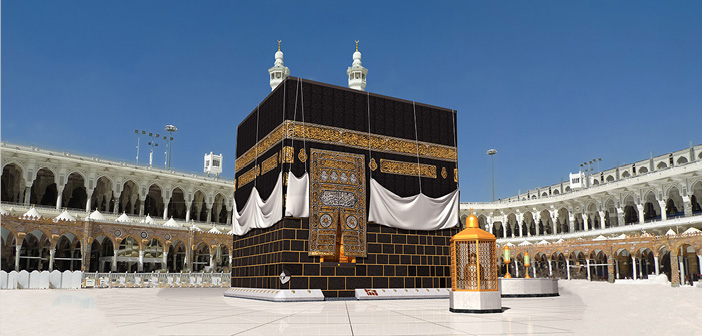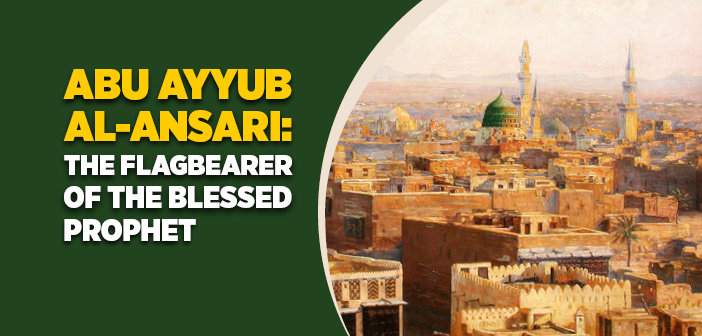Where was the new qibla? Has qibla changed? When was qibla changed?
At the outset, Muslims continued offering their salat facing towards the Masjid’ul-Aqsa, in Jerusalem, something which continued sixteen or seventeen months into the Hegira. The Jews were using the practice as a pretext to verbally assert their supremacy over the Muslims, a cause of much grief for the Blessed Prophet -upon him blessings and peace-. All along, he had his heart set on the Kaabah as qibla, which could have provided the first step to the opening of Mecca to Islam. He was yearning to receive a Revelation in regard. And since the Divine permission had not yet come, the Blessed Prophet’s -upon him blessings and peace- thought remained a mere wish, the realization of which he began patiently anticipating. Ultimately, on a Monday in mid Rajab, as the Noble Messenger -upon him blessings and peace- was offering the midday salat of zuhr in the small mosque in the quarters of the Salima clan, the Almighty revealed His tidings:
“Indeed We see the turning of your face to heaven, so We shall surely turn you to a qibla which you shall like; turn then your face towards the Sacred Mosque, and wherever you are, turn your face towards it, and those who have been given the Book most surely know that it is the truth from their Lord; and Allah is not at all heedless of what they do.” (al-Baqara, 144)
Meanwhile at the closing stages of the second rakah, the Prophet of Mercy -upon him blessings and peace- immediately turned his direction towards Kaabah, and so did the Companions who were following his lead. Together, they all began facing their new qibla, whereby the remaining two rakahs of the salat were completed facing Kaabah. The mosque has since been called Masjid’ul-Qiblatayn, the mosque with two qiblas.[1]
A Companion who was present behind the Prophet -upon him blessings and peace- dropped in on another masjid after leaving, where he saw a group of people offering their salat together. They had just bowed to ruku’, when he exclaimed:
“By Allah, we just offered our salat with the Messenger of Allah towards Kaabah!” The group thereupon instantly changed their direction towards Kaabah.
As exuberantly welcomed as it was by the Believers, the changing of the qibla towards Kaabah enticed the idolaters, Jews and hypocrites to fabricate certain rumors and entertain themselves with unfounded claims, to which the Revelation below responded:
“The fools among the people will say: What has turned them from their qiblah which they had? Say: The East and the West belong only to Allah; He guides whom He likes to the right path.” (al-Baqara, 142)[2]
Ibn Abbas -Allah be well-pleased with him- affords the following:
“Upon changing the qibla to Kaabah compliant with the command of the Quran, the Messenger of Allah -upon him blessings and peace- was met with a question by Muslims:
‘What about the salats of our brothers, Messenger of Allah, who offered it to the direction of Masjid’ul-Aqsa and are now deceased?’
Thereupon the Almighty revealed the below ayah:
“Thus We have appointed you a middle nation, that ye may be witnesses against mankind, and that the Messenger may be a witness against you. And We appointed the qibla which you formerly observed only that We might know him who followes the messenger, from him who turneth on his heels. In truth it was a hard (test) save for those whom Allah guided. But it was not Allah’s purpose that your faith should be in vain, for Allah is Full of Pity, Merciful toward mankind.’ (al-Baqara, 143)[3]
The change of qibla was indeed a significant event. The invalidation of the previous qibla, which the Divine command entailed, was a matter suitable to cause a stir of rumors that could have potentially tricked many away from the truth. The Divine commands regarding the new qibla have therefore been repeated a few times over, addressing the Blessed Prophet -upon him blessings and peace- in person, then the Believers and finally both, and confirming in no uncertain manner, that they were henceforth obliged to hold fast to their new qibla, both in residence and travel.[4]
Elucidating to some extent the underlying wisdom of the change, the confirmation is virtually given an independent meaning in the ayah below:
“And from whatsoever place you come forth, turn your face towards the Sacred Mosque; and wherever you are turn your faces towards it, so that people shall have no accusation against you, except such of them as are unjust; so do not fear them, and fear Me, that I may complete My favor on you and that you may walk on the right course.” (al-Baqara, 150)
From the Divine declaration, we can derive a number of underlying wisdoms:
- The first wisdom underlying the change of qibla, according to the ayah, was to dispossess the People of the Book and the idolaters from any evidence they may have held against Muslims; for the changing of the qibla towards Kaabah was included among the feats of the Final Prophet mentioned in previous scriptures.
Indeed, the passages of the Book of Isaiah in the Old Testament forecasting the future of Mecca make explicit indications. That the Final Prophet -upon him blessings and peace- was still offering salat towards the direction of al-Aqsa when he was really supposed to turn towards Kaabah could have thus cast doubt on the minds of the People of the Book.
Moreover, defying the qibla of Prophet Ibrahim -upon him peace- would have contradicted the Noble Messenger’s -upon him blessings and peace- contention of representing the Nation of Ibrahim, an argument which then could have been used as a sound objection by the idolaters. But after the actual change, such an objection could no longer be made, except by the obstinate, who had made a habit of obscuring the truth.[5]
- The Almighty’s fulfillment of His blessings upon Muslims is another wisdom underlying the change of qibla. Believers were thereby given the new qibla as a contribution towards their ultimate aim of perfection on the path of Truth, the actual blessing, of which the qibla constitutes a part.
- One of the wisdoms that lay beneath the fact that the Blessed Prophet -upon him blessings and peace- offered his salats in the beginning months towards the Bayt’ul-Maqdis was to allude to the common source of all celestial religions and thus warm Jewish and Christian hearts to Islam. This approach could furthermore be considered to have at least reduced the Jewish and Christian dissent during the budding of the Islamic society and state.
At the same time, the incident serves as a proof, among many others, that the Noble Prophet -upon him blessings and peace- did not exercise an authority to intervene on the Holy Quran. In spite of nurturing a great desire for Kaabah to be the new direction of worship, the Blessed Prophet -upon him blessings and peace- nevertheless was made to wait a further sixteen months after the Hegira, which saw the relevant Revelation arrive.
[1] Ibn Saad, I, 241-242.
[2] Bukhari, Iman 30, Salat 31; Muslim, Masajid 11.
[3] Tirmidhi, Tafsir, 2/2964.
[4] See, al-Baqara, 148-149.
[5] See, Elmalılı, I, 537.
Source: Osman Nuri Topbaş, The Prophet Muhammed Mustafa the Elect II, Erkam Publications





